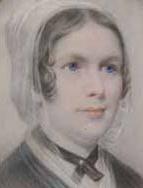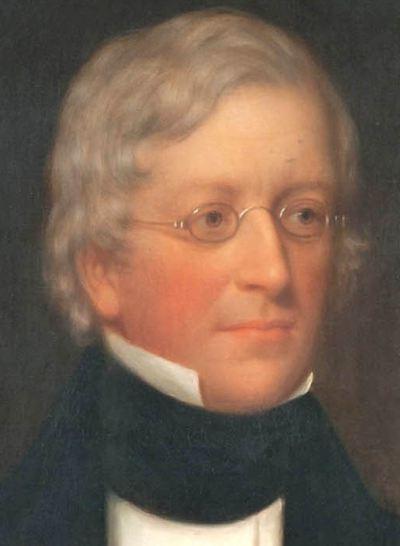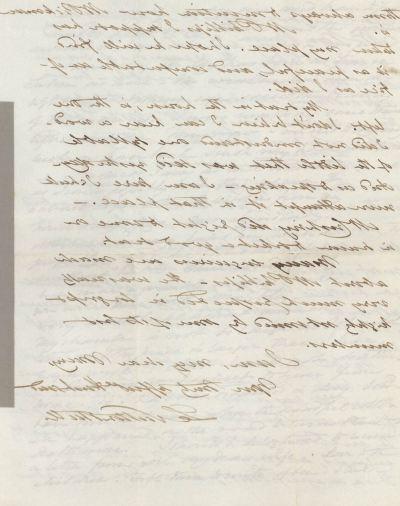Leverett Saltonstall Family Correspondence
This selection of letters from Leverett Saltonstall (1783-1845) to his wife and children include Saltonstall's detailed observations of politics and society in Washington D.C. from 1824 to 1826 and from 1838 to 1843.
After graduating from Harvard College in 1802, Leverett Saltonstall studied law in his hometown of Haverhill, Mass. He was admitted to the bar in 1805 and, in 1806, moved to Salem, Mass. to practice law. There he met Mary Elizabeth Sanders (1788-1858),  the sister of his Harvard classmate Charles Sanders. Leverett and Mary married in 1811 and had four children: Anne Elizabeth (1812-1881); Caroline (1815-1883); Lucy (1822-1890); and Leverett (1825-1895).
the sister of his Harvard classmate Charles Sanders. Leverett and Mary married in 1811 and had four children: Anne Elizabeth (1812-1881); Caroline (1815-1883); Lucy (1822-1890); and Leverett (1825-1895).
Saltonstall was elected by the Federalist party to the Massachusetts House of Representatives in 1813 and served on and off again in the House and Senate through 1834. Between his years of legislative service, he practiced law. One of his maritime cases brought him before the U.S. Supreme Court during the February terms of 1824, 1825, and 1826. It was during these trips that he shared with his wife his first impressions of Washington, writing vivid descriptions of Henry Clay, John Marshall, and Andrew Jackson, and his visit to Mt. Vernon, the former home of George Washington. His letters also include rather frank characterizations of both John Quincy Adams and his wife Louisa Catherine.
 Saltonstall served as Salem’s first mayor from 1836-1838, and was then elected a representative to Congress as a member of the Whig party, serving from 1838 to 1843. Saltonstall wrote to his wife and children almost daily during his four years of service, with detailed observations of Washington personalities and events. “I shall make you a political lady,” he warned his wife in a letter of 12 December 1838. “At any rate," he continued, "you are my political correspondent, and my friends who would know what I am about and what is going on, must apply to you as the fountain head.”
Saltonstall served as Salem’s first mayor from 1836-1838, and was then elected a representative to Congress as a member of the Whig party, serving from 1838 to 1843. Saltonstall wrote to his wife and children almost daily during his four years of service, with detailed observations of Washington personalities and events. “I shall make you a political lady,” he warned his wife in a letter of 12 December 1838. “At any rate," he continued, "you are my political correspondent, and my friends who would know what I am about and what is going on, must apply to you as the fountain head.”
Included among  Saltonstall’s letters are descriptions of the political and social life of Washington, and details of his daily life as a member of Congress. He shares his impressions of Presidents John Quincy Adams and Martin Van Buren, the White House, Henry Clay’s speeches, a slave market in Washington, the inauguration and subsequent funeral of William Henry Harrison, political battles, and finally, his defeat for reelection.
Saltonstall’s letters are descriptions of the political and social life of Washington, and details of his daily life as a member of Congress. He shares his impressions of Presidents John Quincy Adams and Martin Van Buren, the White House, Henry Clay’s speeches, a slave market in Washington, the inauguration and subsequent funeral of William Henry Harrison, political battles, and finally, his defeat for reelection.
Letters to his wife
![]() 26 February 1824
26 February 1824
"'Whereer I roam', I am still ever your's most truly and affectly."
![]() 3 March 1824
3 March 1824
"what would I not give to hear her sing 'Lallah -- Lallah -- diddle -- diddle' this morning"
![]() 9 February 1825
9 February 1825
"before the declaration of the vote, there was a breathless expectation"
![]() 11 February 1825
11 February 1825
"Home what delighful, multiplied, interesting associations does that little word crowd upon the imagination"
![]() 15 February 1825
15 February 1825
"Congress seems incapable of attending to any business that requires exertion."
![]() 20 February 1825
20 February 1825
"Where shall we find -- not his equal -- this cannot be expected again -- but his resemblance..."
![]() 24 February 1825
24 February 1825
"It is particularly proper that I should dwell on the beauties & advantages of Baltimore, as you never happened to meet with any one acquainted with this City"
![]() 23 October 1838
23 October 1838
"Your smiles my dear wife are more precious to me than all the honors of office."
![]() 5 December 1838
5 December 1838
"It is difficult for me to realize it my passage has been so rapid ... short of 46 hours since I left Salem!"
![]() 7 December 1838
7 December 1838
"Washn. has been much improved since I was here ... The Capitol has been finished"
![]() 12 December 1838
12 December 1838
"nothing here is comparable in contributing to my happiness, to hearing from those I have left at home."
![]() 18 December 1838
18 December 1838
"I think of him constantly -- more and more. What a Brother. What a friend he was."
![]() 14 February 1839
14 February 1839
"a man who never said any thing which was worth repeating, & who, if he should be taken away this night, would leave nothing to which one could refer to prove his greatness."
![]() 8 December 1839
8 December 1839
"But how unfortunate for our Country, that we should be so divided, when a change of rulers seems to me to be so important."
![]() 12 December 1839
12 December 1839
"Yesterday we had great excitement. I thought at one moment, we should have had a battle."
![]() 17 July 1840
17 July 1840
"For the first time, my dear wife, I have neglected writing home at least once in two days."
![]() [4 April 1841]
[4 April 1841]
"No one seemed to consider that Genl H. was mortal"
![]() [7 April 1841]
[7 April 1841]
"They mourn the death of the Presdt. as that of a relative or friend."
![]() 11 June 1841
11 June 1841
"Mr. Adams has done us infinite mischief, by his course, & some opinions he has uttered."
![]() [25 August 1841]
[25 August 1841]
"We are approaching a crisis -- what will be the result, I know not."
![]() 9 September [1841]
9 September [1841]
"The House is in much confusion -- like Babel -- all talking about the veto -- some pacifically, some angrily --"
![]() [11 September 1841]
[11 September 1841]
"The Presidt has been fooled & betrayed by a few traitors to our party"
![]() 12 September [1841]
12 September [1841]
"The Washn. news must excite all sorts of passions & emotions -- wonder -- indignation -- exultation -- disappointment -- hope -- fear -- rage -- joy &c. -- &c."
![]() [6 August 1842]
[6 August 1842]
"Shd we be disappd, life would no longer have any charm for us."
![]() 14 August 1842
14 August 1842
"When I do go home, I shall want to be at home -- at rest -- at peace. I shd abhor being toted about"
![]() 18 December 1842
18 December 1842
"I did think I had one thing valuable, to leave to my children—"a good name"—which is better than riches."
![]() 16 February 1843
16 February 1843
"Thank H—n "the agony is over," and I am not chosen."
Letters to his children
![]() 7 January 1839
7 January 1839
"So you have had a horse & chaise disaster. I am sorry."
![]() 30 January 1839
30 January 1839
"I would not have you become a politician, my Son, for many, many years. It is a poor occupation for persons at any period of life, but miserable indeed for youth."
![]() 26 February 1843
26 February 1843
"I shall have no ambition that you should become an active, partisan politician — on the contrary, I should regret it."
